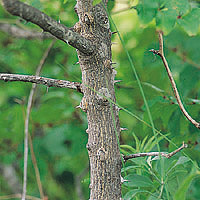Penn Herb Wellness Guide
Prickly AshFind Products
 © Martin Wall
© Martin WallParts Used & Where Grown
The bark and sometimes the berries of these two American trees are used as medicine. There are many other trees in this genus that grow on other continents, including Chinese prickly ash (Zanthoxylum bungeanum), which grows in Asia.
- Reliable and relatively consistent scientific data showing a substantial health benefit.
- Contradictory, insufficient, or preliminary studies suggesting a health benefit or minimal health benefit.
- For an herb, supported by traditional use but minimal or no scientific evidence. For a supplement,little scientific support.
Our proprietary “Star-Rating” system was developed to help you easily understand the amount of scientific support behind each supplement in relation to a specific health condition. While there is no way to predict whether a vitamin, mineral, or herb will successfully treat or prevent associated health conditions, our unique ratings tell you how well these supplements are understood by the medical community, and whether studies have found them to be effective for other people.
For over a decade, our team has combed through thousands of research articles published in reputable journals. To help you make educated decisions, and to better understand controversial or confusing supplements, our medical experts have digested the science into these three easy-to-follow ratings. We hope this provides you with a helpful resource to make informed decisions towards your health and well-being.
This supplement has been used in connection with the following health conditions:
| Used for | Amount | Why |
|---|---|---|
Indigestion, Heartburn, and Low Stomach Acidity | Refer to label instructions | Prickly ash acts as a digestive stimulant and may be helpful for indigestion. |
Rheumatism | Refer to label instructions | The bark was also widely used by herbalists to treat rheumatic conditions. |
Toothache | Refer to label instructions | Prickly ash bark contains alkaloids and a volatile oil. Herculin, an alkamide in the plant, produces a localized numbing effect on the tongue when consumed, which may explain the historical use of prickly ash for toothaches. |
Traditional Use (May Not Be Supported by Scientific Studies)
Many eastern Native American tribes valued prickly ash as a remedy for upset stomach, sore throats, aching muscles, skin infections, to stimulate saliva flow, and various other conditions.1 Eclectic physicians (doctors who recommended herbal medicines) in the United States at the end of the 19th century continued the traditional uses of prickly ash, primarily as a digestive aid, to strengthen the nervous system, and for cholera.2 The bark was also widely used by herbalists to treat rheumatic conditions.3 Prickly ash is also considered an alterative in traditional herbalism, meaning it enhances the body’s ability to fight against and recover from all manner of difficulties.4 Chinese prickly ash (Zanthoxylum simulans) is used for similar indications as its American relative as well as for killing parasites.5
Copyright 2025 TraceGains, Inc. All rights reserved.
Learn more about TraceGains, the company.
The information presented by TraceGains is for informational purposes only. It is based on scientific studies (human, animal, or in vitro), clinical experience, or traditional usage as cited in each article. The results reported may not necessarily occur in all individuals. Self-treatment is not recommended for life-threatening conditions that require medical treatment under a doctor's care. For many of the conditions discussed, treatment with prescription or over the counter medication is also available. Consult your doctor, practitioner, and/or pharmacist for any health problem and before using any supplements or before making any changes in prescribed medications. Information expires December 2025.


